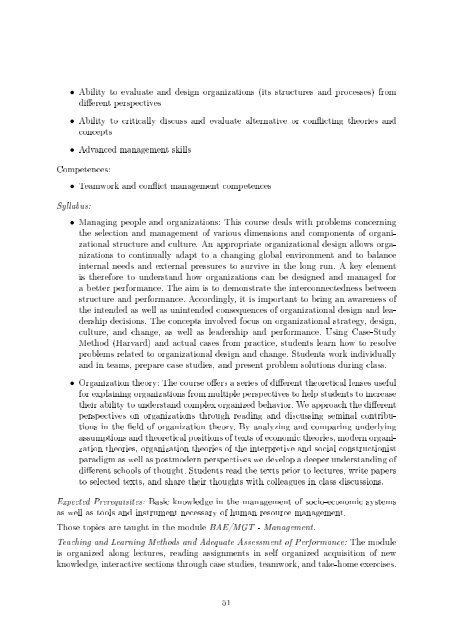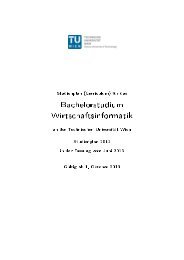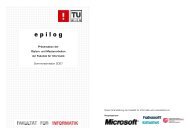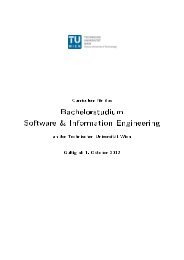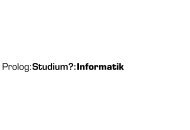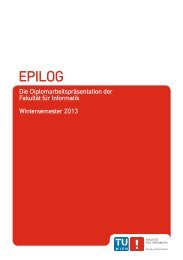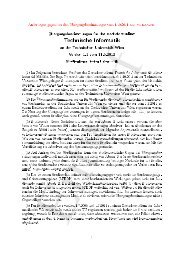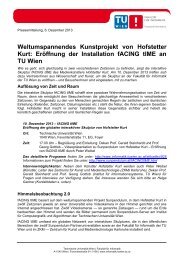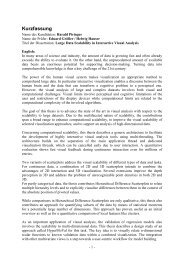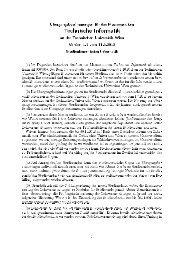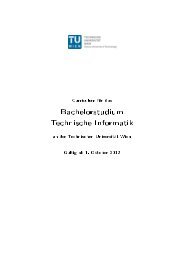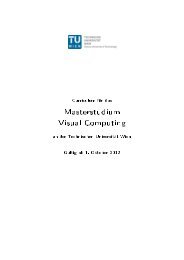Masterstudium Business Informatics - Fakultät für Informatik, TU Wien
Masterstudium Business Informatics - Fakultät für Informatik, TU Wien
Masterstudium Business Informatics - Fakultät für Informatik, TU Wien
You also want an ePaper? Increase the reach of your titles
YUMPU automatically turns print PDFs into web optimized ePapers that Google loves.
• Ability to evaluate and design organizations (its structures and processes) from<br />
dierent perspectives<br />
• Ability to critically discuss and evaluate alternative or conicting theories and<br />
concepts<br />
• Advanced management skills<br />
Competences:<br />
• Teamwork and conict management competences<br />
Syllabus:<br />
• Managing people and organizations: This course deals with problems concerning<br />
the selection and management of various dimensions and components of organizational<br />
structure and culture. An appropriate organizational design allows organizations<br />
to continually adapt to a changing global environment and to balance<br />
internal needs and external pressures to survive in the long run. A key element<br />
is therefore to understand how organizations can be designed and managed for<br />
a better performance. The aim is to demonstrate the interconnectedness between<br />
structure and performance. Accordingly, it is important to bring an awareness of<br />
the intended as well as unintended consequences of organizational design and leadership<br />
decisions. The concepts involved focus on organizational strategy, design,<br />
culture, and change, as well as leadership and performance. Using Case-Study<br />
Method (Harvard) and actual cases from practice, students learn how to resolve<br />
problems related to organizational design and change. Students work individually<br />
and in teams, prepare case studies, and present problem solutions during class.<br />
• Organization theory: The course oers a series of dierent theoretical lenses useful<br />
for explaining organizations from multiple perspectives to help students to increase<br />
their ability to understand complex organized behavior. We approach the dierent<br />
perspectives on organizations through reading and discussing seminal contributions<br />
in the eld of organization theory. By analyzing and comparing underlying<br />
assumptions and theoretical positions of texts of economic theories, modern organization<br />
theories, organization theories of the interpretive and social constructionist<br />
paradigm as well as postmodern perspectives we develop a deeper understanding of<br />
dierent schools of thought. Students read the texts prior to lectures, write papers<br />
to selected texts, and share their thoughts with colleagues in class discussions.<br />
Expected Prerequisites: Basic knowledge in the management of socio-economic systems<br />
as well as tools and instrument necessary of human resource management.<br />
Those topics are taught in the module BAE/MGT - Management.<br />
Teaching and Learning Methods and Adequate Assessment of Performance: The module<br />
is organized along lectures, reading assignments in self organized acquisition of new<br />
knowledge, interactive sections through case studies, teamwork, and take-home exercises.<br />
51


